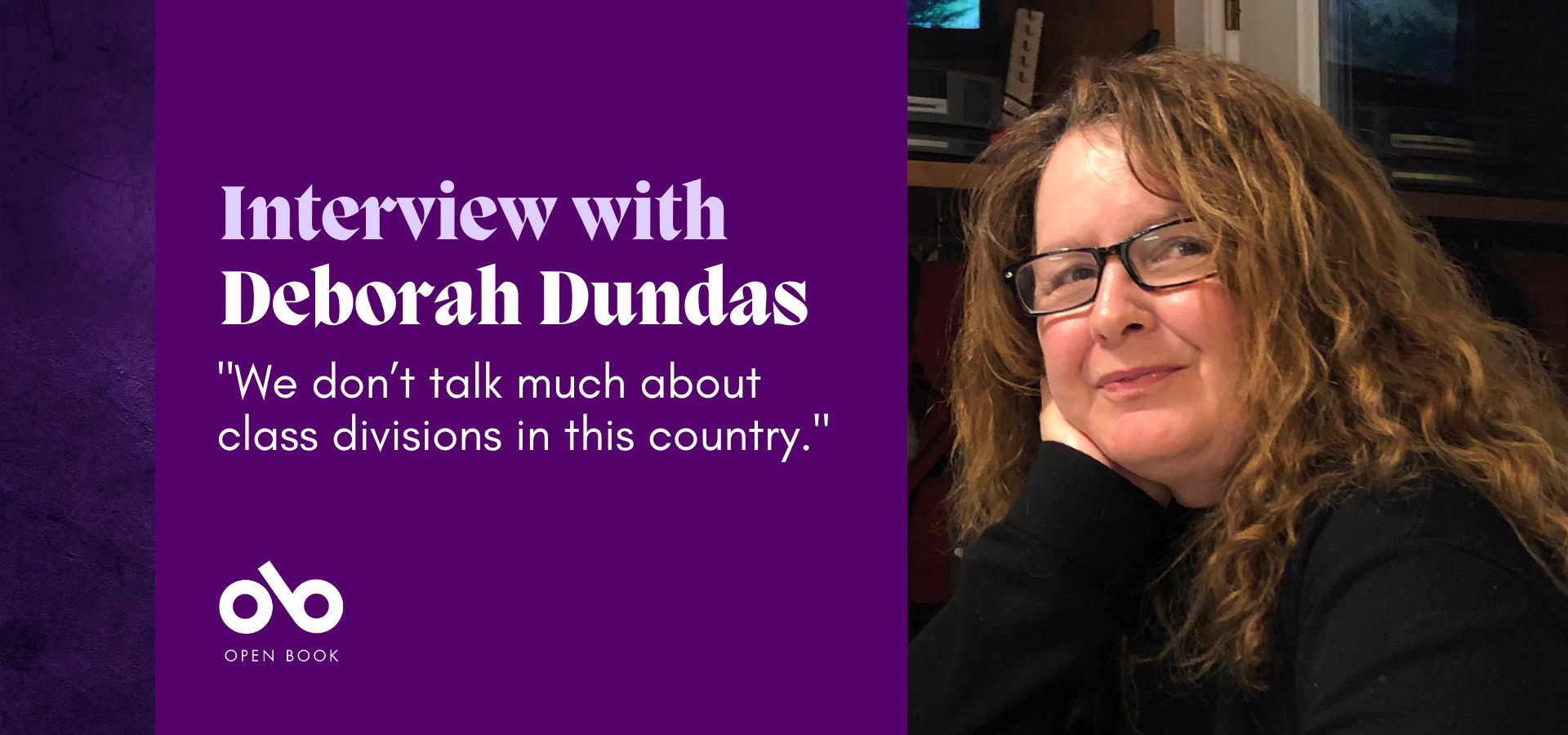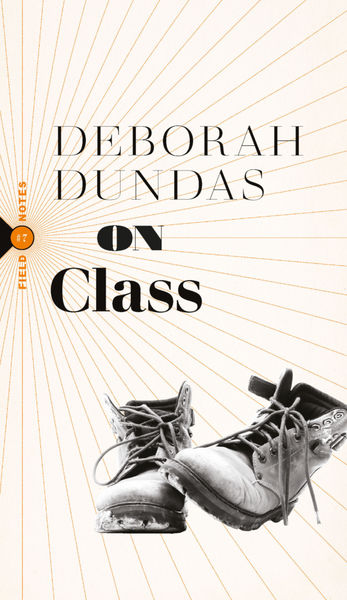Who Gets to Tell Stories? Deborah Dundas Challenges a Collective Reluctance to Talk about Class
These days, Deborah Dundas is known as an acclaimed editor at the Toronto Star, a fixture in the literary and journalistic communities, and a beloved figure who is an insightful, tireless supporter of Canadian writing and publishing.
But her early days were markedly different: growing up poor in the west end of Toronto, when basic necessities represented daily crisis, goals like university and fulfilling work felt miles out of reach. Against the odds, Dundas eventually made it to post secondary education and established herself through decades of celebrated newspaper and television journalism in Canada, the UK, and Ireland. But as she progressed in her career, she couldn't help but noticed there was a subject often shuffled to the side in conversation and journalistic coverage alike: class.
Now Dundas is working to bring dialogue about access, equity, and power as they relate to class into the open, and her slim new nonfiction offering, fittingly and simply titled On Class (Biblioasis), collects discussions with fellow writers, with activists, with people who are poor and those who work with the poor, to powerful effect.
Part of Biblioasis's acclaimed Field Notes series exploring social issues, On Class is urgent and wise, written with Dundas' trademark wit and crisp prose. Raw and smart, it urges readers not to look away from the complexity of issues affecting the poor and working class, especially in a time of constant political, economic, and social turmoil. Putting the focus firmly on underrepresented voices, Dundas's book asks us to talk about what we don't talk about.
In our conversation today, Deborah talks about her love of nonfiction and how it provides "a natural roadmap to the storytelling", why in order to talk about class "we have to be honest about our own experiences of it", and how her next project showcases the themes she'll continue to explore in her work.
Open Book:
What do you love about writing nonfiction? What are some of the strengths of the genre, in your opinion?
Deborah Dundas:
One of the things I love most about writing nonfiction is that, because it is fact-based, there is a natural roadmap to the storytelling. Sure, I have to make decisions about structure, about what to include and not include. But when I’m taking the research I’ve done, and the interviews I’ve conducted, and crafting it into a narrative, the story that needs to be told emerges from the research. The genre allows us to create a compelling narrative out of the research – we all love storytelling and being able to tell nonfiction stories in this way draws us into understand ourselves, our own motivations, and the world around us in profoundly felt ways.
OB:
What do you do if you're feeling discouraged during the writing process? Do you have a method of coping with the difficult points in your projects?
DD:
I just finished an MFA in creative nonfiction, and the collegiality it provided was fantastic. We had mentor groups that met regularly, where we could talk through issues around writing creative nonfiction; we read to each other, giving constructive feedback that was always very positive. I learned a lot from them, including that when I was feeling discouraged having someone to bounce things off of and with whom I could talk about writing really helped. I’m going to keep in touch with people now that the program’s ended – writing might be something that’s done in some sort of isolation, but having a community around you really makes it much easier.
Projects are hard and it can be tempting to internalize things and think that, maybe, this just isn’t a good idea or, maybe, I just don’t have it in me. Having a group of people who understands writing, not only the ups and downs but also the nitty gritty technical details, helps with the former – and maybe finding a way to flesh out the idea or accept that it’s time to abandon it. They also help me to remember that I do have it in me, we all have imposter syndrome, and keeping my fingers hovering over the keyboard or maybe taking a detour down a new rabbit hole might be enough to get me back on track.
Your CanLit News
Subscribe to Open Book’s newsletter to get local book events, literary content, writing tips, and more in your inbox
I’ve also become better at stopping the negative thoughts that plague all writers, I think, and stepping back – and sometimes away – for a bit and returning with fresh eyes.
OB:
Do you remember the first moment you began to consider writing this book? Was there an inciting incident that kicked off the process for you?
DD:
The publisher at Biblioasis, Dan Wells, and I have been talking about class for years, simply in conversation. I would often talk about our working class and lower-class upbringings. When he began to work, he started on the production line at General Motors in Windsor as a welder; I as a secretary who couldn’t afford to go to university. We would often compare notes about the habits of poverty that stuck with us, such as shopping at thrift stores (comparing our best finds), the stories of how we were able to get to university and carve an apparent middle-class life, and also the ways that class hierarchy presented in society in everyday encounters, in broader society and in public policy.
When he launched the Field Note series – we were chatting about my potentially doing one together. The series was modelled on the tradition of pamphleteering, we both thought class would be a perfect subject.
That was the start of it: it’s such a broad topic it took a while to figure out exactly how to frame it, although I knew that it would have to be part memoir: if the idea is to start a conversation about class then we have to be honest about our own experiences of it. On Class is meant to spark conversation: we don’t talk much about class divisions in this country. That means we also don’t talk about privilege, shame, entitlement, opportunity, luck – those things that are important to our own ideas of where we fit in society and what possibilities are open to us. The project began around the spring of 2021, when the Covid-19 pandemic had very starkly exposed inequalities within our society. That became a starting point for the book and guided my research.
OB:
What defines a great work of nonfiction, in your opinion? Tell us about one or two books you consider to be truly great books.
DD:
I think a great work of nonfiction has to tell some truth about the human condition; it has to teach us something about ourselves and give us a new perspective or way of seeing or approaching the world.
Maya Angelou’s I Know Why The Caged Bird Sings, is an astonishing work of creative nonfiction. It was published in 1969, and is the first of seven autobiographies she wrote before her death in 2014, with the last one, Mom & Me & Mom, released in 2013.
Even now, the importance of Angelou’s series and, in particular, this first book, resonates: she explored a different way of handling autobiography and, more specifically, a new way for a Black woman to tell her story. While, structurally, Caged Bird fit into conventional ideas of autobiography – told chronologically and in the first person – in terms of theme and voice it was groundbreaking: a young Black girl telling her own story in her own voice. It made a statement: her story matters and Black stories matter. It also fits into another traditional narrative structure, the fictional picaresque – where the hero (usually from the lower classes and so marginalized) goes through a series of adventures in an episodic narrative. Most notably in the U.S. is Mark Twain’s 1884 novel The Adventures of Huckleberry Finn featuring Jim, the escaped fugitive slave, whose story is told not in his own voice but through the character of Huck.
I Know Why The Caged Bird Sings, is also episodic. A young Angelou travels from Stamp, Arkansas to Chicago, back again and then to California, the route of The Great Migration of Black people in the early 1900s up to the 1970s. Few people were as marginalized as a Black girl child growing up in the Southern United States in the 1930s and ‘40s, with race, gender, age and recent history working against her, when telling the truth or speaking out of turn could get a Black person killed.
And so, with this autobiographical, episodic, picaresque narrative, Angelou changed the way Black stories are told.
Patrick Radden Keefe’s work will be read for decades to come – his most recent book is Empire of Pain, the story of the Sackler family at the centre of the the addiction crisis. The work just before that, which expanded on from an extended piece of about 10,000 he wrote for the New Yorker, was Say Nothing. It was written 20 years after the signing of the Good Friday Agreement in Northern Ireland in 1998 brought an initially uneasy peace to the country, and five decades after the events he wrote about occurred, during the modern Troubles in 1972.
Hundreds of books have been written about the topic, and so what was so remarkable was that he was able to find a fresh way into it. His clear vision as an outsider and his prodigious research and interviewing abilities helped complete a book that was no easy task. He took a famous incident, the “disappearance” of Jean McConville and, from this story about a mother and her family, gave a sense of the impact of the Troubles on individuals and the country, moving from micro to macro, and the dynamics of the political tensions, without taking sides. His book managed to get everything right, and was balanced and nuanced – a masterclass of the genre.
OB:
What are you working on now?
DD:
I’m working on my second book, with the working title Adoption Stories for Simon and Schuster.
It will include about 20 individual stories, each told as an individual chapter, focuses on the stories of siblings, parents, people who were adopted – the whole panoply of perspectives. Together, they’ll provide a deep look into adoption and some of the profound questions about identity and family that it raises. There’s a reason adoption stories are with us from our earliest fairy tales: they deeply touch ideas about what it means to be human and, even if we’re not adopted, unite us in our search to belong and to understand who we are.
The book will include as one chapter my family’s own experience – about which I hope to write a full book at some point: my husband found out when he was 42 that he was adopted, a discovery that changed our family in ways both profound and prosaic.
It looks as if exploring ideas of fitting in, of identity and of figuring out our place in the world, as well as ideas rooted in social justice, are areas I’ll continue to mine in my work.
_______________________________________
Deborah Dundas grew up poor in the west end of Toronto. She is now a writer and journalist, has worked as a television producer and is currently an editor at the Toronto Star. Her work has appeared in numerous publications in Canada, the UK, and Ireland including Maclean’s, The Globe and Mail, The National Post, Canadian Notes and Queries, The Belfast Telegraph and The Sunday Independent. She attended York University for English and Political Science and has an MFA in Creative Nonfiction from the University of King’s College. She lives in Toronto with her husband and daughter and their loving, grumpy cat Jumper.






